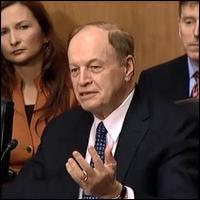By Pam Martens and Russ Martens: May 12, 2015
Senator Richard Shelby, Chair of the Senate Banking Committee, is set to release details of his proposed financial reform legislation today which Wall Street hopes will have so much smoke and mirrors to appease the liberal and conservative factions on the Committee that no one will notice that it’s another big sellout to Wall Street.
The bill will hold out the promise of reforming the Federal Reserve while failing to do anything material to reform it. It will promise to remove unnecessary regulatory burdens on community banks so that they can survive and compete while leaving intact the very financial structure that is killing off community banks faster than you can say Dodd-Frank.
The biggest joke in the proposed legislation is that the Fed will somehow be tamed by allowing the President of the United States to nominate, with Senate confirmation, the President of the New York Fed – the organization that is effectively running the Fed from New York by following the marching orders of the mega Wall Street banks. President Obama’s nominations, with Senate confirmation, have not exactly been a boon to the American people when it comes to other overseers of Wall Street like the Treasury Secretary, the SEC Chair, or the Vice Chairman of the Federal Reserve – all of whom had egregious Wall Street conflicts but were installed anyway.
According to leaks, Shelby’s bill will propose a dramatic increase in the amount of consolidated assets required to designate a bank a “systemically important financial institution” or SIFI. According to rumors, that amount may go from the current $50 billion to potentially $500 billion. While that would relieve some banks of burdensome regulatory filings, it won’t materially change the competitive landscape. Here’s why.
As of June 30 of last year, Bank of America had 5,096 branches spread across the country holding $1.172 trillion in deposits. JPMorgan Chase had 5,682 branches holding $1.079 trillion in deposits. Wells Fargo had 6,314 branches with $1.073 trillion in deposits. With that quantity of branches dwarfing all other banks, backed by multi-million dollar ad campaigns, these mega banks are effectively giant money vacuums, sucking up deposits and making it almost impossible for community banks to compete.
That concentrated money and power then corrupts the financing of campaigns to place more Wall Street cronies in Congress to prevent any meaningful financial reform.
Because these same mega banks are also making wild gambles in exotic derivatives for the house (no, the Volcker Rule has not been implemented, six years after the crash) it means the insured-deposits of the middle class have become wagers against the interests of the same middle class. The London Whale is a case study in this form of hubris.
Tinkering around the edges of financial reform cannot repair the mess on Wall Street. According to media reports, two of the largest Wall Street banks, JPMorgan Chase and Citigroup, are set to plead guilty this week to criminal charges of engaging in a cartel to rig foreign currency trading. Were they using insured deposits to engage in this illegal activity? It’s highly likely. Both banks are serial recidivists, perpetually finding new ways to steal and pay back pennies on the dollar in settlements.
The simple solution – the only workable solution – is to separate banks taking insured deposits from the clubby gambling cartels on Wall Street. It took a previous Congress just four years following the 1929 crash to figure out that this was the only meaningful solution to protect the country from the insatiable, greed-driven practices on Wall Street. The Banking Act of 1933, also known as the Glass-Steagall Act, protected this nation from another Wall Street-induced Great Depression for 66 years until it was repealed under a hypnotic display of delusional thinking in 1999.
The grimy fingerprints of Wall Street are all over other portions of Shelby’s bill: the parts that call for studying everything until the cows come home. All those studies and deliberations called for in the 2010 Dodd-Frank bill have worked so well for Wall Street in delaying or repealing the most important measures.
According to the Wall Street Journal, here’s what the bill will call for in studies:
“The bill would create an independent commission to study whether the 100-year old, 12-district Fed system should be restructured with a mandate to consider a proposal to increase, decrease or otherwise modify the existing district lines and responsibilities of the 12 reserve banks…The panel would make recommendations to Congress, but there would be no requirement for Congress to act on them.
“The bill would direct the Government Accountability Office [GAO] to conduct a study of how the Fed regulates the riskiest ‘systemically important’ financial firms and how its approach should be altered to reduce the likelihood of ‘regulatory capture,’ or the problem of regulators growing so close to firms they oversee that it clouds their judgment.”
The public should expect some nasty surprises in the bill as well, given that the Democrats on the Senate Banking Committee sent a letter of outrage to Shelby, a Republican from Alabama, complaining that he had scheduled it for markup without allowing the Democrats to see a draft of the legislation. The markup is now scheduled for May 21 in an Executive Session of the Senate Banking Committee and will be web cast live. Shelby is currently slated to release the draft at noon today.
Shelby’s bill is to be titled “The Financial Regulatory Improvement Act of 2015.” Given that the bill that repealed the Glass-Steagall Act was known as the Gramm-Leach-Bliley “Financial Services Modernization Act of 1999,” the public should start asking why all this “improvement” and “modernization” of Wall Street has delivered us back to the reckless, casino-capitalism days of Wall Street circa 1929.


